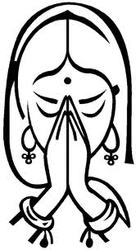In a recent survey by the Pew Research Center, 3,217 Americans were asked to rate religious groups on a 0-100 "feeling thermometer," with 0 representing the coldest and 100 the warmest. Hindus received a lukewarm rating of 50.
There are several reasons for this, I believe. The first is obvious, and not terribly surprising: in a related Pew poll, only 22 percent of Americans said they know a Hindu. This makes sense, since almost all self-identified Hindus are of Indian descent, and while theirs is a hugely successful immigrant story, they've been trickling in only since immigration laws were changed in 1965 and they constitute less than 1 percent of the population.
Your doctor may be Hindu. Your kid's engineering professor may be Hindu. The owner of the hotel down the street may be Hindu. Mindy Kaling, Sanjay Gupta and the last six winners of the national spelling bee may be Hindus. But still, not many people actually know a Hindu personally. And it's only when we really get to know members of a different religious, ethnic or racial group that we drop our preconceptions and stereotypes and let that nice warm feeling in.
If any proof of that is needed, look at the religious groups that ranked warmest on the feeling thermometer: Jews (63) and Catholics (62) (Evangelical Christians scored 61). A century ago --even half a century ago -- scores like that would have been unimaginable; Jews and Catholics were reviled and discriminated against. But over time the rest of America got to know them, and now they make up the entire Supreme Court.
A second reason much of the country lacks warmth for Hindus is that many Americans harbor misconceptions about their religion. This is partly because the story of Hinduism was written mainly by British colonists and Western scholars, and various errors have yet to be corrected in textbooks, despite the efforts of advocacy groups like the Hindu American Foundation and the Dharma Civilization Foundation. Among other things, aspects of Indian culture have been conflated with the nation's dominant religion, so that the caste system and other antiquated customs have come to be seen, erroneously, as central features of Hindu doctrine.
Eventually, that will change, of course, and Hindu children won't be taunted as monkey worshippers. When was the last time you heard someone accuse Jews of drinking the blood of Christian children at Passover?
But here's the weird thing about the Pew surveys. While only 22% of Americans know people who call themselves Hindus, almost everybody knows someone whose life and belief system has been impacted by the multifaceted knowledge base that came to be called Hinduism. As I documented in my book, American Veda, for about 200 years now we have been absorbing, assimilating and adapting insights articulated ages ago in the Himalayas. Some of our most influential thinkers, writers, musicians and scientists were, in varying degrees, shaped by those ideas before transmitting them to the rest of us. In addition, the practices propagated by Indian gurus have taken root in the culture, with millions meditating, chanting and stretching into yoga postures. The fast-growing category of Spiritual but not Religious (SBNR) would not have arisen if practices we think of as Hindu and Buddhist were not made accessible to spiritual seekers and secular self-improvers alike.
But here's the rub: very few of the non-Indian Americans whose values, beliefs and spiritual pursuits are Hindu-esque, or Hindu-like, or quasi-Hindu, call themselves Hindus. They may say they're students of Indian philosophy. They may call themselves yogis, or devotees of this guru or that lineage. They may say they follow the philosophy of Vedanta. They may say that their core beliefs were shaped by the Bhagavad Gita or the Upanishads. Some--including a number of Indians--may say they follow Sanatana Dharma, the term used for centuries before colonial intruders coined the term Hinduism.
Why the reluctance to self-identify as Hindu? Some see it as a form of Hinduphobia. I think it's an aversion to all religion. The yogis, meditators, devotees and SBNRs don't like religious labels or religious lingo, and "Hinduism" is, in common usage, a religious term. They prefer generic, nonsectarian spiritual jargon. Plus, no guru ever asked followers to abandon their own religions -- or lack of religion -- and no Hindu ever tried to persuade anyone to convert. The Hindu-based teachings that came to us from India were presented as universal principles, more akin to scientific laws than religious doctrine, that could be viewed in religious or secular terms according to the individual's orientation.
And therein lies the irony: that universality is one of the great virtues of what we call Hinduism, and it's also the reason the term is not used by so many of the people it has impacted. In time, as Indian-born Hindus assimilate further and accurate information about Hinduism disseminates, the linguistic issues will sort themselves out. Meanwhile, the temperature on the feeling thermometer will surely rise.

